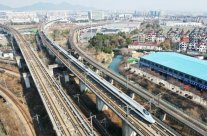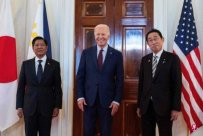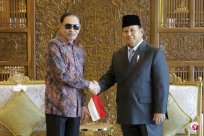Source: Bloomberg
Author: Enda Curran, Alberto Nardelli, Mei Yijie
As the United States is increasingly drawing on the strategy of China and the use of trade weapons, the world's three major economies are entering a new stage of confrontation.This may further split the world, challenging the orthodox concept of maintaining the free market for decades, and also facing European choices.
Seven years ago, the then US President Donald Trump launched the first shot of tariffs on China, and then Joe Biden led the United States into a new era of industrial policy.The third phase of Biden's latest round of tariffs on Chinese -American transit products is based on the first two stages: using tariffs to defend the interests of the United States. At present, subsidies are the core of the policy.Dangerous.
31 trillion US dollars in the international business field has adopted a series of shocks in recent years, including the US -China trade war.The key this time is the EU -on the one hand, it wants to keep their self -proclaimed multilateral rules defenders, and on the other hand, they are worried that when the subsidies and tariffs of distorted markets in the United States and China areEmployment opportunities and tens of billions of dollars will lose.
"Trump put the protective elf out of the bottle," St. Gallen Endowment for Prosperity Through Trade, the headquarters headquarters in Switzerland, said, "No one dares to take it to itGo back.
After the United States announced the addition of tariffs last week, China hinted that it was preparing to impose a maximum tariff on the import of US and European cars, threatening to retaliate on both sides of the Atlantic.
This is because the EU's survey of electric vehicle subsidies is about to end, and the survey may lead to defensive measures for Chinese automobile exports.It is expected that the European Union's tariffs will be greatly lower than the United States, which will meet the World Trade Organization (WTO) rules and procedures in a different way.
Washington launched the latest round of attack on Chinese electric vehicles, semiconductors, batteries, key minerals and other products, and also required other countries to oppose China's industrial policy.According to the United States, China's industrial policies are dumping cheap products around the world, while China counterattacked this allegations.
"More importantly, this sends signals to other parts of the world. No matter who enters the White House, the overall policy direction of the United States priority and the decoupling with China will continue," said former South Korean Minister of Trade, Yeo Han-Koo.
With the Treasury Secretary of the Seventh National Group, the governor of the central bank, and the senior economic officials held a meeting on Steresa, a resort in the Italy on Friday, the situation of trade tensions was waiting for the opportunity.Mathias Cormann, Director -General of OECD (OECD).
"What we should do is to improve global operation and implementation," he told Bloomberg TV, "But we must be very careful not to be scratched because of sorrow."
Export risk
The result of this caused by trade division to China, South Korea, or Japan is more harmful, because the economy of these countries' economies on international trade is higher than that of the United States and may be in many EU countries.
The epidemic has promoted protectionism, but in fact, China also rely more on exports to promote growth.According to WTO data, including Hong Kong, China accounts for about 20%of the global exports, which is twice the proportion of the United States.
The degree of dependence ofhelps to explain why China plays an active role in the WTO -centric system and claims to abide by the rules.This also explains why Beijing has been trying to reach a series of trade agreements with neighboring countries, as well as neighboring countries, and Serbia and Hungary.
But the imbalance between China's GDP (GDP) and the output value of manufacturing is the core of the United States and Europe that the current policy of Beijing is concerned that Beijing's policy may affect the global economy.
Because the US two -party politicians have convinced many voters that raising tariffs and government assistance is a means to save US employment. The increasingly rising trade protectionist boom is almost unobstructed.
WTO or other forums aimed at achieving trade liberalization without the United States play a leading role, some economists will be difficult to predict when this "worse" competition will stop.
Subsidy flooding
Eventtt's Global Trade Alert Study Group data shows that nearly 70%of the $ 14.1 trillion global exports compete with subsidized opponents, which is about 50%higher than ten years ago.The agency tracks the policy of distorting the market.
Christine McDaniel, a former White House trading economist, said that if Chinese importers turn to other places, American farmers will become one of the most impactful groups if Chinese importers turn to other places.
She believes that the rules of the evolution of world trade are changing, and time is flowing backwards.
"We are staying away from the WTO world and return to the world of the Guanjiao General Agreement. At that time, tariffs and subsidies were flooding, but countries were trying to promote the facilitation of international trade, at least with some of their partners," sheIt was said when talking about the rules system before the establishment of the WTO in the mid -1990s.
The risk of multilateralism facing the European Union may be the highest.The EU's post -war economic model is based on a rule -based system. This system encourages open markets and competition.For decades, the United States has been a natural allies leading developing countries.
Now, Brussels officials who still support the WTO rules have begun to feel isolation and helpless.
Two European officials said they believed that the United States had abandoned the principles of trade rules and procedures, and adopted a mainly based on economic security -protecting domestic emerging technologies and strengthening domestic supply chains.Officials said that this approach tried to exclude China.
Sure enough, the European Union has become more decisive, and has recently taken an unimaginable operation a few years ago.
The European Union will complete a survey of nearly a year to quantify Beijing's subsidies for domestic electric vehicle manufacturers. This survey may lead to tariffs.The European Union is also investigating the procurement of Chinese medical device.
New tool for the European Union
The European Union also launched its strict economic security strategy to seek reconciliation between controlling military technology, screening sensitive investment, and reducing the risk of supply chain.
Some officials believe that the EU's approach to Beijing is very naive, while others said that the EU has no choice but to defend the order -based order, because it cannot keep up with the scale of investment and subsidies in the United States and China.
The voices of this alliance consisting of 27 countries have become higher and higher.Former European Central Bank President Dragger was writing a report about how to improve European competitiveness. He called for the protection of the EU industry to avoid further behind in the new technology competition.
"We believe in the global fair competitive environment and rules -based international order, hoping that other countries will do this," said Dragi's earlier in his speech this year. "The region no longer acts in accordance with the rules, and is actively formulating policies to enhance the competitive position.




